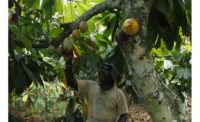Cocoa sustainability is in trouble — because it’s not providing a sustainable income for cocoa farmers.
Extreme poverty among West African cocoa producers fuels cocoa production — farmers in Ghana earn as little as 84 cents a day, and Ivorian farmers, 50 cents.
Consequentially, young farmers are not replacing the aging population, according to the updated U.S. edition of the 2015 Cocoa Barometer. Since Ghana and Cote d’Ivoire produce more than 50 percent of the world’s cocoa supply, these low cocoa prices spell “unsustainable” for the cocoa industry.
Produced by a network of European non-governmental organizations (NGOs), the Cocoa Barometeris a semi-annual report that reviews the state of sustainability in the cocoa sector. This latest edition was co-written with U.S. NGOs and includes updates on programs of the U.S. government and U.S. cocoa companies.
And the issue can’t be ignored any longer, according to the Barometer.
“Despite all the efforts in cocoa at the moment, the core of the problem is still not being addressed: the extreme poverty of cocoa farmers, and their lack of a voice in the debate,” says Antonie Fountain, co-author of the Barometer. “Unless the cocoa sector fundamentally changes, there will be no future cocoa farmers.”
The world’s sweet tooth for chocolate puts others at risk.
“Around the world, child labor is a symptom of extreme poverty and limited opportunity,” says Elizabeth O’Connell, campaigns director at Green America. “In order to prevent children from working in dangerous settings, we must ensure that farmers, including women, sharecroppers and tenant farmers, are earning enough to harvest cocoa sustainably.”
The report is available online at www.cocoabarometer.org. This week from June 30 to July 1, cocoa industry representatives are gathering in Washington at the World Cocoa Foundation conference to discuss ongoing sustainability projects.
Key findings in the 2015 U.S. edition of the report include the following:
• Low incomes. West African cocoa farmers live well below $2 a day, the globally defined poverty level. This leads to bad labor conditions, human rights violations, and other problems, including child labor.
• Cocoa no longer offers an attractive future. Younger generations of cocoa farmers are leaving the industry in increasing numbers while older farmers near the age of life expectancy.
• High market concentration leads to greater farmer exploitation. Mergers and takeovers have resulted in just a few companies dominating up to 80 percent of the whole value chain. Farmers lack the opportunity to voice opinions in an organized way.
• Certified chocolate production is increasing globally, from 2 percent in 2009 to almost 16 percent in 2015. However, as certification becomes mainstreamed, challenges arise. Improvements are needed to address impact on the ground, quality of auditing, and the unrest among farmers concerning their low wages.
• Current approaches fail to solve the problem. Most corporate sustainability efforts focus on increasing a farmer’s productivity. This must be countered with an increased cocoa price for farmers. This means that chocolate needs to become more expensive. Crop diversification, tenure security, better infrastructure and access to information for farmers are also needed.
The solutions for these problems are:
• Develop a living income model for smallholder cocoa farming.
• Address the price-setting mechanisms in order to increase prices at farm-gate level.
• Move from voluntary to mandatory sector-wide solutions.
“All players in the cocoa value chain need to step up to the plate,” says report co-author Fountain. “Companies, governments, retailers, as well as consumers should take their shared responsibility, and truly start looking for new approaches to some of these longstanding problems.”The Cocoa Barometeris published by a European consortium of civil society actors; FNV Mondiaal, Hivos (Netherlands), Solidaridad (Netherlands) and the VOICE Network — ABVV/Horval (Belgium), Berne Declaration (Switzerland), FNV (Netherlands), Oxfam Novib (Netherlands), Oxfam Wereldwinkels (Belgium), Stop the Traffik (UK), and the Südwind Institut (Germany).
The 2015 USA edition of the Cocoa Barometer was also written with Green America, the International Labor Rights Forum, and Oxfam America.







